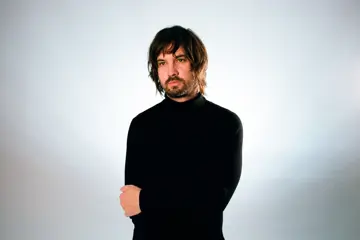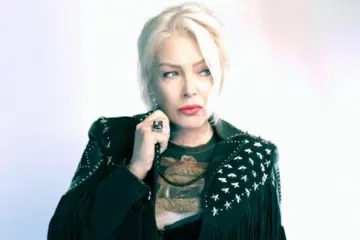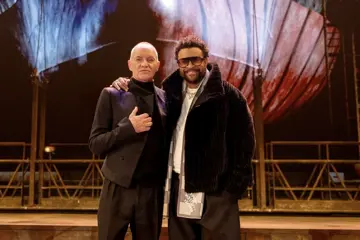"Oh, I'm excited,” bassist Matt Van Schie says of Van She's new record – seemingly finding it difficult to even think of any other response to releasing a second album after a five year wait. “I mean, finally, we're actually going to have another album out. It's only since we've been doing these interviews that it's really hit home. It's finally coming out. We've been in rehearsals and practicing new songs but it's only been lately that it's all seemed real.”
Van She were one of the most distinctive acts of their type. Alongside Muscles, Cut Copy and The Presets, the Sydney quartet helped usher in a new movement in Australian music in the late noughties – a localised blend of post-punk, electro-house and synth-pop that, through acts like Art Vs Science and Miami Horror, is still popular nearly five years after its initial 2007/08 boom. Yet, Van She stood apart from their peers.
Somewhat presciently, theirs was a sound less enamored with brutal electro (a la The Presets) or technicolour synth-pop (a la Cut Copy) and more entranced with less electronic flavours like shoegaze, disco and indie-rock. Breakthrough single Kelly (from 2005's self-titled EP) owed more to The Cars than any electronic artist. You couldn't accuse any of their peers of formula – but Van She offered something especially unique for their era.
“We didn't actually mind being lumped in with all of those acts back in the old days. We're all on Modular and, when you're signed to Modular, you're very much a part of a family – so it's not that surprising that people lump us in with those acts. We are on the same record label. But, when you're talking about songs, I think there is a point of difference and I do prefer people acknowledge that difference.”
Don't miss a beat with our FREE daily newsletter
To this end, Van She's absence has been felt. The band rose to prominence quite swiftly throughout the mid-to-late noughties – their debut EP produced aforementioned hit Kelly while debut album V debuted at number ten on the ARIA Charts. For a handful of years, they were mainstays on the festival circuit. If Van She weren't performing as a band, their DJ alter egos Van She Tech would decorate the bill. Nevertheless, they eventually faded from view. “I think, for any band, there's always a question of whether you'll make it to the next album,” Van Schie says candidly. “In our minds, though, we always knew we wanted to make a second album. After V, we did start writing. We were just doing other things at the same time and it didn't quite work. Tomek [Archer, drums] was finishing his masters degree in architecture, the other two guys were doing Van She Tech, I did solo stuff.
“I think we needed to kind of go through that four-year process, in a way. We needed to mature and figure some more stuff about songwriting and production. You know, we decided to produce the record ourselves and, when you're doing that for the first time, it's always going to take longer. I just think this was a process we needed to go through, though. I think we're a better band for it.”
Van Schie seems to be of two minds about the album's lengthy gestation period – his impatience mollified only by his satisfaction with the resulting record. Diplomatically less than enthused by the band's debut album (“I still love V, I just think of it more as a stepping stone; it was something we had to do”), the bassist is irked by delays, but seems to take solace in having a record of which he can truly be proud.
“I do think it's a fun record. I'm excited for people to hear it. I think that people will enjoy it,” he says confidently. “I don't really feel a lot of pressure any more. I did. Before we handed the album over to Modular last year, I was really anxious about it all. Once they had it and loved it, though, that pressure kind of evaporated. Right now, I just want people to hear it. I want to show it to people.”
Ultimately Van Schie seems comforted by what Idea Of Happiness has already done for Van She as a band. On multiple levels, Idea Of Happiness's hyper-convoluted genealogy has strengthened Van She as a unit – from giving the band the confidence to produce their own work, to allowing them to redevelop their (now-ubiquitous) style, to simply bringing them closer together as individuals.
“We took a longer path this time around but I think because of it our process will be a lot smoother in the future. It's very important to us to be able to produce our own stuff, for example. We like to think of ourselves as the whole package, in a way. I think we should have produced our first album – but I know we just weren't ready to take that leap. We've dealt with that learning curve as a band with this record, though.
“You know, a lot of this process was like that. It took so long because we kind of had to fumble our way through the process but we're a better band because of it. We didn't have a clear vision for this album but, after writing thousands of songs, we gradually kind of picked up on this tropical vibe and everybody loved it, which is rare for our band. It gave us a focus for the album.
“Even just as friends. We weren't friends when we formed Van She, we were just musicians. I'd like to think part of the past four years has simply been devoted to us figuring each other out as friends and growing in that way,” he muses. “And all of that stuff can kind of be fed back into the next album. We don't want to take another four years. I'd like to get something turned around as quickly as possible, almost.”















